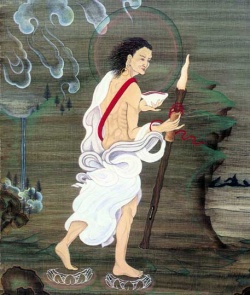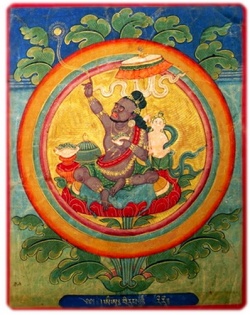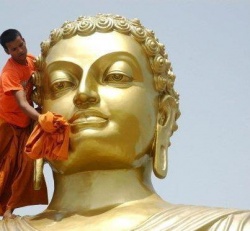Precepts
<poem> In the First Part, Buddha elaborates precepts which made people praise him or the Sangha as worthy of reverrence. The list of Buddha's Higher Precepts are categorized like this:
- 1. Abstain from taking another creature's life, weapon, violence.
- 2. Abstain from taking things which were not given.
- 3. Live soberly, holy, and honest.
- 4. Abstain from sexual relationship.
- 5. Not lying.
- 6. Speak only the truth, believeable and reliable, and never contradicting his own words
- 7. Abstain from slandering,
- 8. promote, speak, and love union (harmony) and not division (conflicts)
- 9. not speaking rough, insulting words. *10. speaking polite, likeable, exact, the right words and able to make people's heart joyful.
- 10.not wasting idle time, gossipping,
- 11.discussing about the Dhamma and Vinaya on the right time
- 12.discussing in clear, detailed, and understandable words
- 13.abstain from hurting the seeds, plants, roots, branches, cheating, trading, slavery, forgery, bribery, and criminal conducts
- 14.abstain from hoarding foods, drinks, clothes (robes), beddings, perfumes, spices, and other tools
- 15.taking meal once a day,
- 16.abstain from watching shows (dances, exhibitions, matches, music performances, parade, etc)
- 17.abstain from playing games (card games, board games, dices, game of chance, racing game, acrobatics, word games, etc)
- 18.abstain from using luxurious furniture and beddings
- 19.abstain from using cosmetics, make-up, fancy and luxurious clothes (robes),
- 20.abstain from discussion about people, politicians, criminals, terrors, food and beverages, clothings, places, families, cities, wars and battles, heroes, ghosts, street rumors, speculation on how the world is created, or about existence and non-existence
- 21.abstain from accusing or denying or goading or challenging (i.e: 'I practised this Dhamma devoutly but you don't!' or 'What you utter is old rubbish' or 'You are wrong!' or 'Free yourself if you can!)
- 22.abstain from being courier or messengers of politicians or higher administrations
- 23.abstain from deceiving lay people by uttering spells to exorcise demon or make someone's fortunate, acting like a holy person by reciting mantras
- 24.abstain from earning money from fortune-telling, divination, clairvoyance, exorcism, conjuring, magic tricks, spell, making medicine and herbs, healing people, leading/conducting ceremonies in order to gain something (wealth, fertility, etc)
Eighteen beliefs about the past
In the second part, Buddha explains about the major beliefs of the ascetics in India. He began by saying, "Monks, there are other things which is very deep (profound), very hard to understand, very difficult to perceive, so holy and sacred, unreached by means of mind, so subtle, that only understood and experienced by the wise. These things had been perceived clearly, seen clearly and had been left by Tathagata, and by this act based on the truth that people praise and reverred Tathagatha. What are those things?"
A precept (sikkhàpada) is a self-imposed rule or discipline. The moral rules that all who call themselves Buddhists are obliged to live by are called the five Precepts (pa¤casãla).
The Five Precepts
They are:
- not to harm living beings
- not to steal
- not to sexually exploit others
- not to lie
- not to take alcohol or other intoxicating drugs
In following these Precepts one gradually develops a respect for the life of others, for their property, their dignity, their right to know the truth and a respect for the clarity of one’s own mind. The Buddha called the practice of these Precepts a consideration to others which ‘creates love and respect and which is conducive to helpfulness, non-dispute, harmony and unity’ (A.III,287).
On another occasion he called virtue ‘freedom-giving’ and ‘conducive to concentration’ (A.III,132). He also mentioned that one of the most important benefits of practicing the Precepts is that one experiences ‘the happiness of being blameless’ (D.I,70).
The Eight Precepts
In addition to these Precepts, serious Buddhists will try to practice the eight Precepts (aññhasãla) at least on the New Moon and Full Moon days of every month. The eight Precepts are:
- not to harm living beings
- not to steal
- not to engage in any sexual activity
- not to lie
- not to take alcohol or other intoxicating drugs
- not to eat after midday
- to abstain from dancing, singing, playing or listening to music, personal adornment and makeup
- not to use high seats or beds
The Ten Precepts
It will be noticed that while the five Precepts pertain to moral behaviour, the last three of the eight Precepts add behaviour that is conducive to simplicity, peace and reflection. Novice monks and nuns are expected to practice the ten Precepts (dasasãla) in preparation for their monastic life. These ten are:
- not to harm living beings
- not to steal
- to abstain from sexual behaviour
- not to lie
- not to take alcohol or intoxicating drugs
- not to eat after midday
- to abstain from dancing, singing and musical entertainment
- to abstain from adornment and makeup
- not to use high seats or couches
- not to use gold and silver i.e. money.
The ten Precepts are most likely meant as a summary of the core precepts to be followed by monastics.




